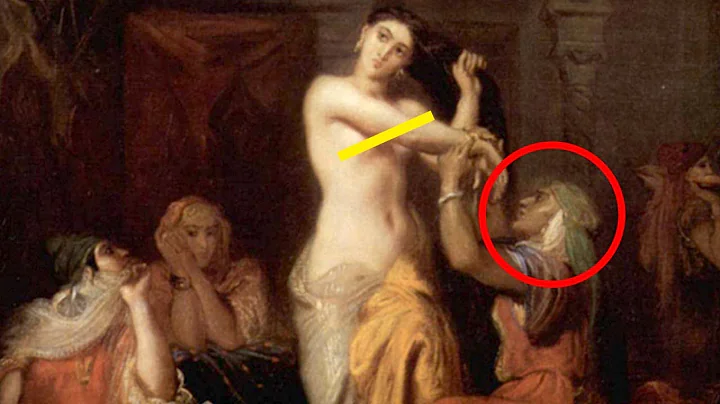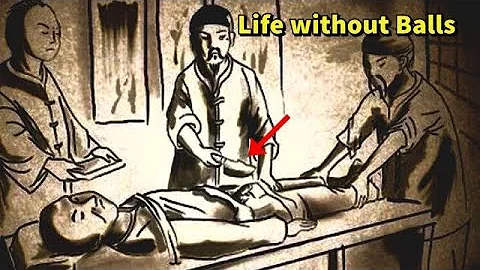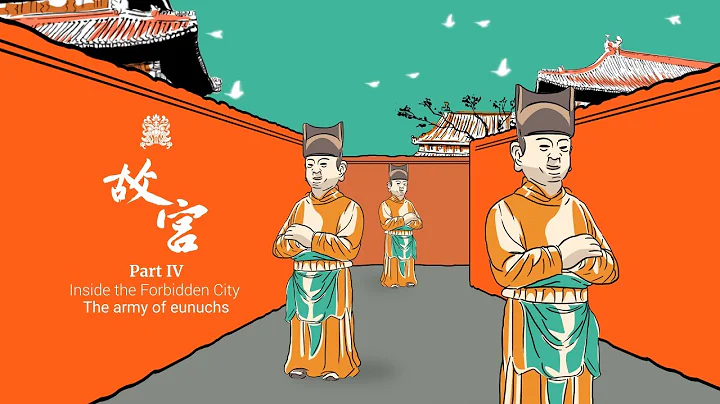The eunuch (commonly known as "eunuch") is a person dedicated to emperors, monarchs and their clan servants in ancient China. In the pre-Qin and Western Han dynasties, eunuchs were not all eunuchs. Since the Eastern Han Dynasty, eunuchs were all eunuchs who had lost the ability to intercourse after being castrated. Eunuchs are also called eunuchs, middle officials, internal officials, internal ministers, and internal servants in Chinese history. In the Ming Dynasty, it was also called "Banpan" for the elderly eunuchs.

Speaking of eunuchs, no one is unfamiliar. For China, the history of eunuchs has a long history, from Zhao Gao in the Qin Dynasty to Zheng He in the Ming Dynasty and then Li Lianying in the late Qing Dynasty. It can be said that the eunuch has run through the entire Chinese history. As for when and where it originated, it has not been verified yet. We only know that it is not unique to China. It has existed in many ancient countries in the world.
In ancient Greece thousands of years ago, Herodotus, the "Father of History", described the eunuch in his masterpiece "History of the Greek-Persian War". According to the book, the eunuchs at that time mainly came from the Persian Empire in the East. The locals felt that compared with normal people, the eunuchs who lost their functions were more reliable. Coincidentally, many Chinese emperors also believed that.
During the reign of Darius, he repeatedly asked the surrounding areas to send castrated boys to him for special purposes. There were five hundred people in a group. It can be seen that the eunuch culture was also extremely popular in Persia at that time. In addition, in Greece, which is adjacent to Persia, there are also many businessmen doing similar activities. They use all means to abduct some children and sell them to the palace at high prices for huge profits.
The cruel methods of these people and the secretiveness of their actions are beyond comparison with the current human traffickers.

In the ancient Roman Empire at the same time as the Han and Jin Dynasties, eunuchs were not rare.
According to relevant information, during the reign of Claudius I, a considerable number of officials were eunuchs. Nero, Claudius' successor, even castrated a little boy and married him back home, treating him as a normal woman.
As everyone knows, Nero was a very cruel monarch. During his reign, he acted cruelly, killing his mother and several wives, and executed many Senate members. At the same time, he was also extravagant and indulged in art. , Construction and other things. Even, in order to monitor people's words and deeds, he set up many spy organizations and gave them to an eunuch to take charge, just like the two factories in the East and West in the Ming Dynasty.
In addition to ancient Greece and ancient Rome, ancient Africa also had similar eunuchs, which may surprise some people. According to the information that the author found, in ancient Egypt, purification was very closely related to sacrifices. It's just that, because the history at that time was too far away from the present, it is difficult to find direct evidence for this statement.
However, we can still find some indirect evidence from some unearthed cultural relics. Someone inferred from some archaeological studies: some priests in ancient Egypt, in order to show their piety, would voluntarily castrate when worshiping. The causality here is very complicated. Because of the limited space here, the author will not expand them one by one.

As we said earlier, the history of eunuchs has a long history in China. So, are there eunuchs in other countries in Asia besides China?
The answer is yes, we will mention this later.
described this issue in the "General History of Arabia" written by the authoritative American professor Hitti. According to the description in the book, just like ancient China, the eunuch has formed a system in the Arab Empire. However, their system did not come from China, but from Eastern Rome.
During the Abbasid dynasty, dependents, eunuchs and high-ranking officials lived in a place that accounted for one-third of Baghdad City. There are also some other information mentioned: At that time, many eunuchs were white and were called Celaric. In addition, there were a large number of black eunuchs who were in charge ofIn charge of the diet and daily life of the concubines. Because they were all castrated people, the emperor was very relieved of them.
The eunuchs of the Ottoman Empire are also very famous in history. In the Ottoman period, the white eunuchs were extremely powerful, not only responsible for educating the officials of the empire, but also responsible for defending the private warehouses of the sultan. The power can be said to be temporary. Two.

In India, there is a special group called "Hygilas". They were castrated through religious ceremonies when they were adolescents.
However, unlike the eunuchs who can enter and exit the palace in China, the social status of "Hagilas" in India is not too high. The only difference between them and ordinary people is that they can pray for people in some religious activities. . Under normal circumstances, they are rejected by mainstream society, and their living conditions can be said to be very miserable. Even, it is unimaginable that such groups still exist today.
Because of the influence of Chinese culture, Vietnam and North Korea also had eunuchs in ancient times. Yuan Shun, the last emperor of the Yuan Dynasty, had an eunuch named Pu Buhua who was a Korean. According to legend, Pu Buhua and Qi Chengniang, the queen of the time, have known each other since they were young, and they had love for each other. Later, because of an accident, Qi's family was selected into the palace by the emperor of the Yuan Dynasty. In order to be able to follow Qi's family, Pu Buhua voluntarily entered the palace as a castrate to serve Queen Qi.
It can be said that he was an eunuch for love and the first foreign eunuch in Chinese history. Li Guofeng said: "Don’t spend arrogance, recruit power and accept bribes, and all the people who run and compete are out of the door. There are Zhao Gao, Zhang Rang, Tian Lingzizhi The wind is not growing. Everyone knows that it is only the master and the uncle of His Highness.”
The situation in Vietnam is similar to that in North Korea. At that time, the emperor of the Ming Dynasty constantly asked North Korea and Vietnam for eunuchs, making Many eunuchs in the Ming palace came from these two places.

But Japan is an exception, because there are no eunuchs in Japan.
Why does this happen?
Japan is similar to Europe. The royal servants are a part of the noble ranks. In short, at least the nobles serve the emperor, especially the core servants. The backgrounds are generally more prominent, very few If there are civilians, there is naturally no possibility of using eunuchs as servants.
Moreover, because of the absolute mainstream status of Buddhism in Japan (it was true before the Meiji era), it is actually very common to be ordained. However, because of the difference in the earliest precepts, the restrictions on Japanese monks’ duties as secular are very small. At this time, monks become monks. A major source of close servants (such as secretaries and other in-house servants), because of the precepts, it is approximately equal to the eunuch to a certain extent.
Also, in ancient my country, there was a saying that "the emperor is not close to the person who is left behind". In fact, using eunuchs to take care of the life of the royal family is not ethical. Japan is a feudal country, and the emperor is completely emptied. Obviously, there is no need to spend a huge price to build a team of eunuchs. Moreover, the Japanese emperor did not have many concubines to watch.

It can be said that eunuchs have existed for a long time in Chinese and foreign history. Although their status is low and their destiny is tragic, they have used their close relationship with the royal family to misbehave. Even, it was the control of the political affairs that caused the country to fall into chaos.
And this system of eunuchs also caused endless suffering and caused countless tragedies.
References:
["Han and Tang History", "Eunuchs in Ancient China: History of Eunuchs", "Secrets of Eunuchs"]





















